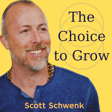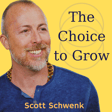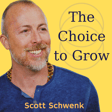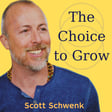
Heal Your Gut: Transform Your Life with Dr. Alejandro Junger
What if most chronic symptoms—fatigue, anxiety, brain fog, even autoimmune disease—weren’t your body’s flaws, but signals of deeper imbalance?
In this episode of The Choice to Grow, Dr. Alejandro Junger, founder of the Clean Program and pioneer of functional medicine, unpacks the root causes of modern illness and why our healthcare system is built to suppress, not solve. From detoxing emotions to healing the gut, this conversation is a masterclass in reclaiming your body’s natural intelligence.
Whether you're struggling with your health or seeking more vitality, this episode will shift the way you see your symptoms—and yourself.
Dr. Alejandro Junger - Functional Medicine Doctor, Cardiologist, Gut Health Expert
Dr. Alejandro Junger is a renowned cardiologist, functional medicine doctor, and the founder of the Clean Program, as well as a New York Times best-selling author. With decades of experience in medicine, Dr. Junger has dedicated his career to uncovering the root causes of complex health issues that often seem unrelated. His journey began with a profound intuition that a deeper understanding was needed, leading him to explore the intricate connections between Eastern and Western medicine, as well as ancient wisdom and modern science.
Through his extensive practice, Dr. Junger discovered that many health challenges are linked to one vital system: the gut. This insight propelled him to develop a holistic approach focused on healing the gut, supporting the body's natural detoxification processes, and restoring essential nutrients for optimal function. His innovative protocol has not only transformed his own health, resulting in a newfound vitality, but has also proven to be a powerful method for his patients.
Inspired by these results, Dr. Junger founded the Clean movement, which emphasizes the importance of gut health in overall wellness. His signature 21-day full-body reset program is meticulously designed to restore the body’s natural balance through nutrient-dense smoothies, supplements, and whole-food meals. Participants often report a significant shift in mindset and the cultivation of uplifting habits. On a cellular level, the program skillfully redirects energy and nutrition to enhance detoxification, reduce inflammation, and promote gut repair.
Scott Schwenk - Master Coach, Spiritual Teacher, Culture Architect
Host and creator of the podcast The Choice To Grow, Scott is known for his hugely popular courses and workshops with OneCommune.com, Younity.com, Wanderlust Festivals, and Unplug Meditation, Scott has been catalyzing the inner evolution of others for decades: helping them to grow, transform obstacles into opportunities, and find Love within.
Scott spent several years living and studying in a meditation monastery which introduced him to the core body of Tantric meditation traditions which continue to flow through each of his teachings. Scott continues to study and teach from two key Tantric lineage streams.
Scott’s teachings support the entire person to not only progressively recognize, stabilize and embody our inextricable oneness with the source of creation (Waking Up), but also to resolve the wounds of the past (Cleaning Up), continually expand our capacities for wider and more inclusive perspectives on any moment (Growing Up) and creatively and joyfully participate and collaborate with all of life as a loving thriving human being (Showing Up).



